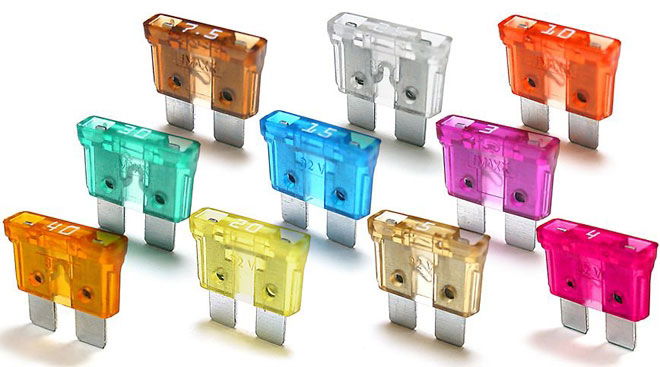Fuses Vs. Circuit Breakers – What’s The Difference?
05 July 2018

Fuses and circuit breakers are designed to interrupt the power to a circuit when the current flow exceeds safe levels. For example, if your toaster shorts out, a fuse or breaker should “trip”, protecting the wiring in the walls from melting. As such, fuses and breakers are primarily intended to protect the wiring — UL or CSA approval supposedly indicates that the equipment itself won’t cause a fire.
Fuses contain a narrow strip of metal which is designed to melt (safely) when the current exceeds the rated value, thereby interrupting the power to the circuit. Fuses trip relatively fast. Which can sometimes be a problem with motors which have large start up current surges. For motor circuits, you can use a “time-delay” fuse which will avoid tripping on momentary overloads. A “time-delay” fuse looks like a spring-loaded fuse. A fuse can only trip once, then it must be replaced.
Breakers are fairly complicated mechanical devices. They usually consist of one spring loaded contact which is latched into position against another contact. When the current flow through the device exceeds the rated value, a bimetallic strip heats up and bends. By bending it “trips” the latch, and the spring pulls the contacts apart. Circuit breakers behave similarly to “time-delay” fuse – that is, they tend to take longer to trip at moderate overloads than ordinary fuses. With high overloads, they trip quickly. Breakers can be reset a finite number of times – each time they trip, or are thrown when the circuit is in use, some arcing takes place, which damages the contacts. Thus, breakers should not be used in place of switches unless they are specially listed for the purpose.
Neither fuses nor breakers “limit” the current per se. A dead short on a circuit can cause hundreds or sometimes even thousands of amperes to flow for a short period of time, which can often cause severe damage.
Why fit a circuit breaker instead of a fuse?
While conventional fuses may be less expensive to install, their disadvantages can be particularly apparent in an automotive environment. The degree of electrical protection they provide is often inadequate for modern electrical systems and their potential for abuse is a serious problem for many vehicle operators. By comparison, circuit breakers of the correct type and rating offer significant benefits for the protection of vehicle wiring.
- They are not subject to nuisance operation through transients or high in-rush currents such as lamp loads. Their rating can therefore be closely matched to the cable, guaranteeing optimum protection.
- They will discriminate between motor start and prolonged stall conditions; motor windings can therefore be successfully protected.
- They are not liable to premature failure through corrosion, fatigue, shock or vibration, or other external ageing influences.
- There is no need to carry replacements. The risk of using unsuitable temporary fuse substitutes is avoided.
- They cannot be overridden but are conveniently resettable once the fault has been rectified.
- Many different models and mounting arrangements are available to meet differing requirements.
- Redundancy: If you have a critical application, having the ability to reset the fuse at a touch of a button.
- The Ministry of Defence and many of the Emergency services use circuit breakers to provide a fast reset of critical systems, both for Emergency Response systems and communications equipment.
- Cost: this is odd as on face value circuit breaker will cost hundreds of times more than a standard fuse, but if you factor in the cost in time or potential call out from a customer to fit a new fuse then the initial outlay becomes insignificant.
For more information on our ranges of fuses and breakers, please visit our catalogue web site at www.dun-bri.com, or contact us for help on 01763 274185…
Carling Technologies,Circuit Breakers, Fuses,